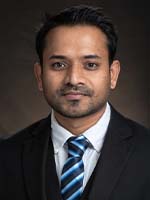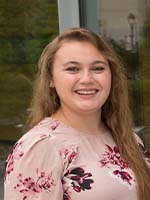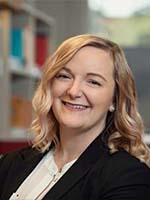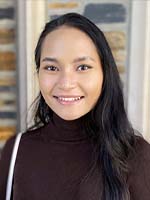ASPET is proud to announce the selection of ten awardees to participate in the 2022 Washington Fellows program. The mission of the Washington Fellows program is to enable developing and early career scientists interested in science policy to learn about and become more engaged in public policy issues. Get to know this year’s class:
Santo Kalathingal Anto – North Dakota State University
 Santo was born and raised in Kerala, India. He earned his bachelor’s degree in Pharmacy from the College of Pharmaceutical Sciences, Trivandrum, India. He also holds a master’s degree in Regulatory Toxicology from the National Institute of Pharmaceutical Education and Research, Mohali, India. He is currently pursuing a Ph.D. in the Department of Pharmaceutical Sciences at North Dakota State University. Under the mentorship of Dr. Stephen T. O’ Rourke, his research is focused on the understanding of blood pressure regulation by the novel peptide apelin in coronary arteries under hypertensive conditions and thereby better understand the safety profile of apelin-based therapies, as well as developing new therapeutic strategies in cardiovascular diseases. As an ASPET fellow, he hopes to learn and inculcate the way to effectively communicate with officials that have the power to make science-based policies and thereby make a better impact of scientific research on the well-being of the community.
Santo was born and raised in Kerala, India. He earned his bachelor’s degree in Pharmacy from the College of Pharmaceutical Sciences, Trivandrum, India. He also holds a master’s degree in Regulatory Toxicology from the National Institute of Pharmaceutical Education and Research, Mohali, India. He is currently pursuing a Ph.D. in the Department of Pharmaceutical Sciences at North Dakota State University. Under the mentorship of Dr. Stephen T. O’ Rourke, his research is focused on the understanding of blood pressure regulation by the novel peptide apelin in coronary arteries under hypertensive conditions and thereby better understand the safety profile of apelin-based therapies, as well as developing new therapeutic strategies in cardiovascular diseases. As an ASPET fellow, he hopes to learn and inculcate the way to effectively communicate with officials that have the power to make science-based policies and thereby make a better impact of scientific research on the well-being of the community.
Keti Bardhi – Washington State University

Keti was born and raised in Albania. She received her bachelor’s degree in Biology from Rochester Institute of Technology. She became involved in research as a freshman and developed her passion for science through participation in numerous research opportunities. After finishing her undergraduate degree, she worked for three years as a laboratory technician at the University of Maryland, Baltimore (UMB). While at UMB, she assisted with studies examining the effects of perinatal hypoxia-ischemia on the developing cerebellum with and without prior inflammation under the mentorship of Drs. Mary McKenna and Jaylyn Waddell. Currently, Keti is pursuing her Ph.D. in Pharmaceutical Sciences and Molecular Medicine at Washington State University. Working under the mentorship of Dr. Philip Lazarus, she is investigating the potential drug-drug interactions between cannabis and commonly prescribed drugs. In addition to research, Keti is actively engaged in outreach and advocacy. She serves as the President of the International Student Association and as the President-Elect of the Association for Women in Science, two student-led organizations that advocate for international students and women in STEM. As an ASPET Washington Fellow, Keti hopes to learn more about policymaking and to encourage fellow scientists to advocate for themselves and engage with lawmakers.
Morgan Carson-Marino – University of Florida
 Morgan was born in Orlando, Florida in the United States. He received a Bachelor of Science degree in Biomedical Sciences at the University of Central Florida (UCF), a Master of Science degree in Medical Sciences with a focus in translational research in neurodegenerative disease at the University of Florida (UF) College of Medicine (COM) and is anticipated to complete his Doctor of Pharmacy degree in May 2022. At UF-COM, Morgan became an American Heart Association (AHA) Scholar by earning an AHA Stroke Council Student Scholarship in Cerebrovascular Disease and Stroke. He was then admitted to the UF College of Pharmacy (COP) and continued his research initiatives in the Department of Pharmaceutical Outcomes and Policy. Morgan’s early policy engagement efforts include local, state, national and international activities such as serving on the UF-COP Policy and Advocacy Committee, on the Student Assembly in the American Public Health Association (APHA), on the Florida Society of Health-system Pharmacists (FSHP) Legal and Regulatory Affairs Council, and as a United Nations (UN) Global Health Fellow. He was also a certified vaccinator during the coronavirus pandemic. As an ASPET Washington Fellow, Morgan hopes to promote evidence-based policies and practices to legislators, delve deeper into healthcare policy decision-making, and respond to the ever-changing needs of public health and disease prevention.
Morgan was born in Orlando, Florida in the United States. He received a Bachelor of Science degree in Biomedical Sciences at the University of Central Florida (UCF), a Master of Science degree in Medical Sciences with a focus in translational research in neurodegenerative disease at the University of Florida (UF) College of Medicine (COM) and is anticipated to complete his Doctor of Pharmacy degree in May 2022. At UF-COM, Morgan became an American Heart Association (AHA) Scholar by earning an AHA Stroke Council Student Scholarship in Cerebrovascular Disease and Stroke. He was then admitted to the UF College of Pharmacy (COP) and continued his research initiatives in the Department of Pharmaceutical Outcomes and Policy. Morgan’s early policy engagement efforts include local, state, national and international activities such as serving on the UF-COP Policy and Advocacy Committee, on the Student Assembly in the American Public Health Association (APHA), on the Florida Society of Health-system Pharmacists (FSHP) Legal and Regulatory Affairs Council, and as a United Nations (UN) Global Health Fellow. He was also a certified vaccinator during the coronavirus pandemic. As an ASPET Washington Fellow, Morgan hopes to promote evidence-based policies and practices to legislators, delve deeper into healthcare policy decision-making, and respond to the ever-changing needs of public health and disease prevention.
Shelby Coates – Washington State University
 Shelby was born in The Woodlands, Texas and raised in Olympia, Washington. She received her Bachelor of Science degrees in Biology and Chemistry with an emphasis in Biochemistry from Pacific Lutheran University. While at Pacific Lutheran University, she cultivated her love of science through multiple academic research opportunities both in the United States and abroad. Following her undergraduate education, she moved to Spokane, Washington to pursue a Ph.D. in Pharmaceutical Sciences and Molecular Medicine in the Department of Pharmaceutical Sciences in the College of Pharmacy and Pharmaceutical Sciences at Washington State University (WSU). Under the mentorship of Dr. Philip Lazarus, her research is focused on characterizing the potential drug-drug interactions between cannabis and commonly prescribed drugs. In addition to research, she has remained active and involved in her campus community through her role as President of the Association for Women in Science (AWIS) WSU Virtual Chapter, her role as Treasurer of the Graduate Research Student Association (GRSA), and her role as a Graduate Student Liaison. As an ASPET fellow, Shelby hopes to utilize her personal experiences as a researcher to advocate for increased STEM education and increased funding of biomedical research.
Shelby was born in The Woodlands, Texas and raised in Olympia, Washington. She received her Bachelor of Science degrees in Biology and Chemistry with an emphasis in Biochemistry from Pacific Lutheran University. While at Pacific Lutheran University, she cultivated her love of science through multiple academic research opportunities both in the United States and abroad. Following her undergraduate education, she moved to Spokane, Washington to pursue a Ph.D. in Pharmaceutical Sciences and Molecular Medicine in the Department of Pharmaceutical Sciences in the College of Pharmacy and Pharmaceutical Sciences at Washington State University (WSU). Under the mentorship of Dr. Philip Lazarus, her research is focused on characterizing the potential drug-drug interactions between cannabis and commonly prescribed drugs. In addition to research, she has remained active and involved in her campus community through her role as President of the Association for Women in Science (AWIS) WSU Virtual Chapter, her role as Treasurer of the Graduate Research Student Association (GRSA), and her role as a Graduate Student Liaison. As an ASPET fellow, Shelby hopes to utilize her personal experiences as a researcher to advocate for increased STEM education and increased funding of biomedical research.
Dylan Eiger – Duke University School of Medicine
 Dylan was born in Philadelphia, Pennsylvania and raised in North Wales, Pennsylvania. He received his bachelor’s degree in Chemistry with a concentration in Biochemistry from Duke University in 2016. As an undergraduate student, he worked in the laboratory of Dr. Stephen Craig where he focused on polymer chemistry and material science, studying mechanically reactive molecular units called mechanophores. During this time, he also developed a passion for medicine by working with patients domestically and internationally. He spent three months living in the Philippines where he helped restructure the health education curriculum at an orphanage in Metro Manila. Following his undergraduate education, he decided to stay at Duke and join the M.D./Ph.D. program at Duke University School of Medicine. He has completed two thirds of his medical training and is currently in the final year of his Ph.D. in the Department of Biochemistry. Underneath the mentorship of Dr. Sudarshan Rajagopal, he researches the signaling mechanisms of G protein-coupled receptors (GPCR), the largest receptor family in humans and the target of approximately one-third of U.S. Food and Drug Administration approved drugs. Specifically, he focuses on the phenomenon of biased agonism which describes how different drugs can bind to the same GPCR but generate unique biochemical and cellular responses. Outside of the lab, Dylan serves as a tutor for high school, undergraduate, and medical students, plays soccer in the local community, and is a passionate enthusiast of food and wine. After finishing his M.D./Ph.D., Dylan plans on completing his residency training in internal medicine and fellowship training in cardiology. As an ASPET fellow, Dylan hopes to learn how he can use his background in research and clinical medicine to advocate for young scientists and physician-scientists conducting basic and translational biomedical research.
Dylan was born in Philadelphia, Pennsylvania and raised in North Wales, Pennsylvania. He received his bachelor’s degree in Chemistry with a concentration in Biochemistry from Duke University in 2016. As an undergraduate student, he worked in the laboratory of Dr. Stephen Craig where he focused on polymer chemistry and material science, studying mechanically reactive molecular units called mechanophores. During this time, he also developed a passion for medicine by working with patients domestically and internationally. He spent three months living in the Philippines where he helped restructure the health education curriculum at an orphanage in Metro Manila. Following his undergraduate education, he decided to stay at Duke and join the M.D./Ph.D. program at Duke University School of Medicine. He has completed two thirds of his medical training and is currently in the final year of his Ph.D. in the Department of Biochemistry. Underneath the mentorship of Dr. Sudarshan Rajagopal, he researches the signaling mechanisms of G protein-coupled receptors (GPCR), the largest receptor family in humans and the target of approximately one-third of U.S. Food and Drug Administration approved drugs. Specifically, he focuses on the phenomenon of biased agonism which describes how different drugs can bind to the same GPCR but generate unique biochemical and cellular responses. Outside of the lab, Dylan serves as a tutor for high school, undergraduate, and medical students, plays soccer in the local community, and is a passionate enthusiast of food and wine. After finishing his M.D./Ph.D., Dylan plans on completing his residency training in internal medicine and fellowship training in cardiology. As an ASPET fellow, Dylan hopes to learn how he can use his background in research and clinical medicine to advocate for young scientists and physician-scientists conducting basic and translational biomedical research.
Kelsey Kochan – University of Michigan
 Kelsey is from Taylor, Michigan, and received her bachelor’s degree in Biology from the University of Michigan. Participating in pharmacological research at the University of Michigan fostered Kelsey’s interest in research and the biomedical sciences. Here Kelsey also became involved in several student advocacy and community outreach groups focusing on mental health and drugs of abuse. Namely, Kelsey became President of Scientists for Outreach on Addiction Research (SOAR). This student-run organization creates a communication channel between addiction research experts and the surrounding community. Additionally, SOAR hosts community Narcan training sessions for intervention in the event of opioid overdose. To merge these interests in research and advocacy, Kelsey is currently pursuing a Ph.D. in Pharmacology at the University of Michigan. Under the mentorship of Dr. John Traynor, Kelsey’s thesis characterizes a safer alternative approach for pain therapeutics in an effort to replace traditional opioid use. In addition to research, Kelsey enrolled in the Science, Technology, and Public Policy certificate program at the University of Michigan. This program provides the opportunity to learn the foundations of science and health policy while teaching us how to communicate in the policy field and analyze and develop political strategies. As an ASPET Washington Fellow, Kelsey hopes to learn how to effectively advocate for biomedical research and increase the accessibility of its findings.
Kelsey is from Taylor, Michigan, and received her bachelor’s degree in Biology from the University of Michigan. Participating in pharmacological research at the University of Michigan fostered Kelsey’s interest in research and the biomedical sciences. Here Kelsey also became involved in several student advocacy and community outreach groups focusing on mental health and drugs of abuse. Namely, Kelsey became President of Scientists for Outreach on Addiction Research (SOAR). This student-run organization creates a communication channel between addiction research experts and the surrounding community. Additionally, SOAR hosts community Narcan training sessions for intervention in the event of opioid overdose. To merge these interests in research and advocacy, Kelsey is currently pursuing a Ph.D. in Pharmacology at the University of Michigan. Under the mentorship of Dr. John Traynor, Kelsey’s thesis characterizes a safer alternative approach for pain therapeutics in an effort to replace traditional opioid use. In addition to research, Kelsey enrolled in the Science, Technology, and Public Policy certificate program at the University of Michigan. This program provides the opportunity to learn the foundations of science and health policy while teaching us how to communicate in the policy field and analyze and develop political strategies. As an ASPET Washington Fellow, Kelsey hopes to learn how to effectively advocate for biomedical research and increase the accessibility of its findings.
Saranya Radhakrishnan, PhD – National Institute of Mental Health
 Saranya Radhakrishnan was born and raised in Chennai, India. She received her bachelor’s degree in Bioengineering from India and during a semester abroad program, she got the opportunity to explore life sciences research. Following her undergraduate education, she gained research experience in diverse fields ranging from cancer genomics to developmental neurobiology. This brought her to an interdisciplinary life sciences graduate program at Purdue University where she continued her research in neurobiology under the mentorship of Dr. Mathew Tantama. Her graduate research focused on developing genetically encoded fluorescent tools to study changes in neuronal redox and applying these tools to study neurodegenerative disorders. After graduation, she joined the National Institute of Mental Health as a visiting postdoctoral fellow, where she is currently working with Dr. Susan Amara on understanding the redox regulation of glutamate transporters. In addition to research, Saranya has been a member of Purdue’s Women in Science Program leadership team and has actively engaged in outreach and advocacy events. She has also been passionate about being able to communicate science in an accessible manner to all audiences. As an ASPET fellow, she hopes to leverage her communication skills and leadership experience to advocate for biomedical research and address the issue of diversity in STEM, specifically the lack of representation of women and minorities in science.
Saranya Radhakrishnan was born and raised in Chennai, India. She received her bachelor’s degree in Bioengineering from India and during a semester abroad program, she got the opportunity to explore life sciences research. Following her undergraduate education, she gained research experience in diverse fields ranging from cancer genomics to developmental neurobiology. This brought her to an interdisciplinary life sciences graduate program at Purdue University where she continued her research in neurobiology under the mentorship of Dr. Mathew Tantama. Her graduate research focused on developing genetically encoded fluorescent tools to study changes in neuronal redox and applying these tools to study neurodegenerative disorders. After graduation, she joined the National Institute of Mental Health as a visiting postdoctoral fellow, where she is currently working with Dr. Susan Amara on understanding the redox regulation of glutamate transporters. In addition to research, Saranya has been a member of Purdue’s Women in Science Program leadership team and has actively engaged in outreach and advocacy events. She has also been passionate about being able to communicate science in an accessible manner to all audiences. As an ASPET fellow, she hopes to leverage her communication skills and leadership experience to advocate for biomedical research and address the issue of diversity in STEM, specifically the lack of representation of women and minorities in science.
Mason Rodriguez – Vanderbilt University

Mason was born and raised in Pegram, a small rural town west of Nashville, Tennessee. A first-generation college student, he received a Bachelor of Science degree in Neuroscience after three years of study at the University of Tennessee Knoxville. While at UT, Mason found his passion for research as an assistant in a behavioral neuroscience lab where he presented his research at eight different conferences, including Posters On The Hill 2021 in which he presented to interested members of Congress in D.C. Mason also participated as a volunteer for an afterschool program for underprivileged youth in Knoxville in his last year. His experience as a volunteer gave him insight into the extreme need that exists for myriad populations within the U.S. and reinforced his desire to make a meaningful impact in communities that are plagued by various neuropsychiatric diseases and addiction.
Currently, Mason is a research assistant in a behavioral neuroscience lab within the Warren Drug Discovery Center at Vanderbilt University. Under the auspices of Dr. Daniel Foster, he is studying the effects of novel compounds on the cellular and molecular mechanisms involved in regulating chemical and electrical signaling in various neurodegenerative diseases. Mason also participates in the Big Brother Big Sister program in Nashville that caters to helping underprivileged youth have an outlet for sports and physical activity-related needs in conjunction with a friend/mentor.
As an ASPET Washington Fellow, Mason hopes to cultivate a better understanding of science and healthcare-related public policy decision-making at the local, regional, and national levels, so that ultimately he can learn how to advocate for disparate communities at all levels. Specifically, he hopes to better understand the underlying issues behind the economics of research and healthcare including, affordability, predatory practices, and misallocation of resources.
Khairunnisa Semesta – Duke University

Khairunnisa (Nisa) was born and raised in Yogyakarta, Indonesia. She received her bachelor’s degree in Biology from New York University Abu Dhabi. While at NYU Abu Dhabi, she studied in 5 different countries and sharpened her academic research skills, investigating genome organization in the nucleus and developing a portable device to detect pathogenic E. coli food contamination. Following her undergraduate education, she moved to Durham, North Carolina, to begin her doctoral research. She is currently pursuing a Ph.D. in Pharmacology and Cell & Molecular Biology at Duke University. Under the mentorship of Dr. Nikoleta Tsvetanova, her research aims to discover novel factors that regulate G-protein coupled receptor signaling, a target of one-third of clinically available drugs. Specifically, she is uncovering the role of a novel GPCR repressor in a neuropsychiatric disorder. Her research work won the first place in the ASPET Molecular Pharmacology poster competition at Experimental Biology 2021 and has been recognized by predoctoral fellowships from the American Association of University Women and American Heart Association. In addition to research, she is pursuing a concurrent MA degree in Bioethics and Science Policy at Duke University, serves as Technology Transfer Fellow in Duke University’s Office of Translation and Commercialization, and regularly volunteers her time to mentor prospective applicants of STEM graduate programs in the United States. As an ASPET fellow, Nisa hopes to gain an understanding of the complex legal and regulatory environments of the scientific innovation enterprise. Through this effort, she hopes to enable effective, ethical, and equitable biomedical research translation into tangible solutions that address unmet medical needs.
Cora Smiley, PhD – University of South Carolina School of Medicine

Dr. Smiley was raised in Charleston, South Carolina and received her undergraduate degree in Biomedical Sciences at the University of South Carolina (UofSC). As an undergraduate, her classes in neuroscience inspired a passion for research and she was able to start her career in behavioral neuropharmacology at the UofSC School of Medicine. Following graduation, she received her doctorate in Neuroscience from the Medical University of South Carolina where her research was focused on testing treatments for comorbid post-traumatic stress disorder and substance use disorder, specifically targeting the prefrontal cortex to alleviate stress induced relapse for alcohol and marijuana. Currently, Dr. Smiley is pursuing her postdoctoral fellowship in the lab of Dr. Susan Wood at the UofSC School of Medicine. Her research is focused on identifying the underlying mechanism responsible for the increased prevalence of mental health conditions in the female population. Specifically, she is examining the intersection of ovarian hormones and neuroinflammation and their impact on anxiety-like symptoms and opioid seeking behavior after stress exposure. As an ASPET Washington Fellow, Dr. Smiley hopes to learn how scientists can be involved in the policy making process, with her main goals of impacting policy regarding treatment for mental health conditions and addressing the current opioid epidemic.